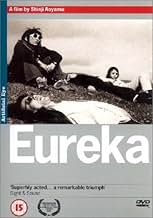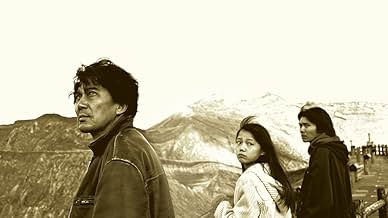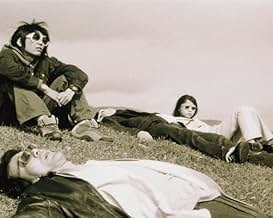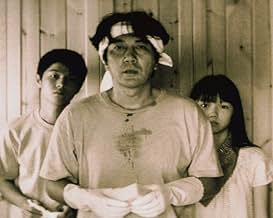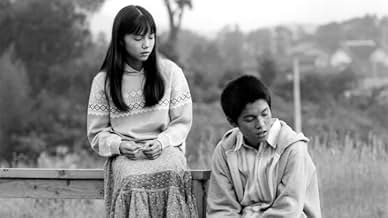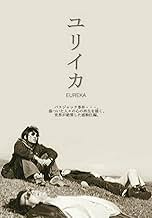IMDb-BEWERTUNG
7,7/10
4544
IHRE BEWERTUNG
Die traumatisierten Überlebenden einer mörderischen Busentführung kommen zusammen und machen einen Roadtrip, um zu versuchen, ihr beschädigtes Selbst zu überwinden. Währenddessen läuft ein S... Alles lesenDie traumatisierten Überlebenden einer mörderischen Busentführung kommen zusammen und machen einen Roadtrip, um zu versuchen, ihr beschädigtes Selbst zu überwinden. Währenddessen läuft ein Serienmörder frei herum.Die traumatisierten Überlebenden einer mörderischen Busentführung kommen zusammen und machen einen Roadtrip, um zu versuchen, ihr beschädigtes Selbst zu überwinden. Währenddessen läuft ein Serienmörder frei herum.
- Auszeichnungen
- 4 Gewinne & 2 Nominierungen insgesamt
Empfohlene Bewertungen
Some people have a disliking for Japanese cinema because the movies tend to be slow paced, minimalistic. If you're one of them - skip EUREKA is all you need to know. The movie moves along at a snail's pace on Sunday - at 90 minutes most movies are just coming to their explosive and or dramatic climax, but at that point I was still wondering what Eureka was about. 2 hours later the movie finally finishes - and I was still wondering what it was all about.
EUREKA is a movie of epic length, that raises other challenging questions like "Why is it 3.5 hours long?", "Why is it black and white?", "Is this all going somewhere?" and "Is it nearly finished yet?". Clearly director Shinji Aoyama wants his movie to make us think. And in 3.5 hours of black and white imagery and minimal dialogue, your mind certainly does have ample opportunity to wander.
Maybe I should have checked the "Director's Statement" that is included on the UK DVD before watching the movie. Then I'd have known what he was trying to say, and could have spent my time deciding if he said it effectively instead. Whether that would have been more fun or less I don't know though.
Not to say that I didn't enjoy watching EUREKA - for most of the run time I did. It's very well acted, has some good cinematography and is generally quite unusual. I'd have preferred it to have been shorter though, or had more going on - even colour photography would have helped to keep my attention on the screen with a little less effort.
I do think it's a good movie though, but... it just didn't need to be 3.5 hours to make its point or build its characters. Or maybe it did need 3.5 hours to do that, but Shinji Aoyama used his time badly - because at the end I still didn't really have a grasp on who the characters were 'deep down', or what the point of sharing their story with us was. Perhaps it's just that it's a movie aimed for better minds than mine to truly appreciate though. Certainly the length and style are going to keep any hopes of mainstream appreciation at bay.
EUREKA is a movie of epic length, that raises other challenging questions like "Why is it 3.5 hours long?", "Why is it black and white?", "Is this all going somewhere?" and "Is it nearly finished yet?". Clearly director Shinji Aoyama wants his movie to make us think. And in 3.5 hours of black and white imagery and minimal dialogue, your mind certainly does have ample opportunity to wander.
Maybe I should have checked the "Director's Statement" that is included on the UK DVD before watching the movie. Then I'd have known what he was trying to say, and could have spent my time deciding if he said it effectively instead. Whether that would have been more fun or less I don't know though.
Not to say that I didn't enjoy watching EUREKA - for most of the run time I did. It's very well acted, has some good cinematography and is generally quite unusual. I'd have preferred it to have been shorter though, or had more going on - even colour photography would have helped to keep my attention on the screen with a little less effort.
I do think it's a good movie though, but... it just didn't need to be 3.5 hours to make its point or build its characters. Or maybe it did need 3.5 hours to do that, but Shinji Aoyama used his time badly - because at the end I still didn't really have a grasp on who the characters were 'deep down', or what the point of sharing their story with us was. Perhaps it's just that it's a movie aimed for better minds than mine to truly appreciate though. Certainly the length and style are going to keep any hopes of mainstream appreciation at bay.
It has been almost 6 years since I saw this film, yet this film can stick with me and still offer me things.
After a tragic incident of violence, a bus driver tries to find two other teen-aged survivors, a brother and sister. The sparse black and white camera work provide an insight into the bleak emotional landscape as they just stumble through as "walking dead". Having lost a father, I can identify with the characters. What is touching is the lack of communication and dialogue between the actors (whic includes the lead of the Japanese "Shall We Dance" ). Yet there is love and communication made even by just the thumping on bus walls. Words fail them.
The camera work is bleak yet stunning in composition and texture. Minimal yet just enough to feel the principals trying to find meaning in life. One can also speak of the Japanese economic downturn and the resulting introspective dramatic films such as Hirokazu's "After Life". If have experienced grief or if you'd like to find some insight into it, this may be a film. It seemed shorter than the four hours, but you are forewarned.
After a tragic incident of violence, a bus driver tries to find two other teen-aged survivors, a brother and sister. The sparse black and white camera work provide an insight into the bleak emotional landscape as they just stumble through as "walking dead". Having lost a father, I can identify with the characters. What is touching is the lack of communication and dialogue between the actors (whic includes the lead of the Japanese "Shall We Dance" ). Yet there is love and communication made even by just the thumping on bus walls. Words fail them.
The camera work is bleak yet stunning in composition and texture. Minimal yet just enough to feel the principals trying to find meaning in life. One can also speak of the Japanese economic downturn and the resulting introspective dramatic films such as Hirokazu's "After Life". If have experienced grief or if you'd like to find some insight into it, this may be a film. It seemed shorter than the four hours, but you are forewarned.
10aapp22
During its epic 3,5 hours of duration I managed to make some coffee, fry some eggs and let me assure you that I was a totally different man when it ended - It made me think about the real meaning of life, its beauty and subsequent horrors which we all go through at some point in our existence.
This is sophisticated film-making at its best.
This is sophisticated film-making at its best.
Amazing film. The reviews posted - at the time of this writing - on the IMDb page are sad, because I don't think the writers were ready for what kind of movie it is. (Stephen Holden's pan in the New York Times is especially foolhardy and thoughtless.) It helped to have a little advanced word, in order to brace myself. As it stands, it should have defeated "Dancer in the Dark" at Cannes last year, handily. And if I see a better movie this year, it'll be something for the history books.
It's not for the faint of heart. It's three hours and thirty-seven minutes long, in black and white, and in Japanese. And it's very slow-moving. The cinematography is beautiful, but that may not be enough for folks to hack through nearly four hours.
But the extreme length and slowness is not unjustified. It opens with a horrifying, traumatic event that provides an emotional undercurrent that informs the remainder of the story, in much the same way as "Saving Private Ryan" did (let that not discourage the anti-Spielbergers), and as the film progresses, the event becomes a memory, part of the characters' and ours, too. And the slowness isn't really slowness - it's the playing out of events and interactions as they would happen in real time (the story spans a few months, I believe, perhaps even a year, and maybe more).
"What's the freaking story?" I hear you ask...well, here goes. The opening sequence, which will undoubtedly inspire comparisons and contrasts to "The Sweet Hereafter" (as will the entire film), shows the hijacking of a commuter bus by a businessman pushed over the edge. As the scene unfolds, he has already killed a few passengers, the police are surrounding the bus, and he has used newspapers to block all the windows.
Without revealing too much, the bus driver and two teens - a brother and a sister - survive the incident. The driver (Koji Yakusho, star of "Shall We Dance?" and "The Eel") is shaken deeply, and leaves his brother and parents to wander. The youths' mother runs off with another man, and their father dies soon after in an auto accident - with insurance payments, they can live, but there is no one to watch over them.
I could go into more of the plot - and most critics will, I'm sure - but that isn't really necessary. The key to the movie is that the events seem to be played out as they would in real life, and that the movie camera just "happens to be there" to catch them and tell the story. Sure, this is the goal of all narrative films, but with "Eureka," the process seems to have been reinvented and renewed. The film is longer than most, but not a moment is wasted; it's one of the most efficiently edited movies I've ever seen. Every shot, nuance, glance, spoken word, everything has a reason for being.
There are some who say the movie is too somber, too gloomy. It isn't really. It's somber, sure, but it doesn't strain for it. There is humor - deadpan, mostly - and great joy, too. And if you love great cinema, there is even greater joy!
It's not for the faint of heart. It's three hours and thirty-seven minutes long, in black and white, and in Japanese. And it's very slow-moving. The cinematography is beautiful, but that may not be enough for folks to hack through nearly four hours.
But the extreme length and slowness is not unjustified. It opens with a horrifying, traumatic event that provides an emotional undercurrent that informs the remainder of the story, in much the same way as "Saving Private Ryan" did (let that not discourage the anti-Spielbergers), and as the film progresses, the event becomes a memory, part of the characters' and ours, too. And the slowness isn't really slowness - it's the playing out of events and interactions as they would happen in real time (the story spans a few months, I believe, perhaps even a year, and maybe more).
"What's the freaking story?" I hear you ask...well, here goes. The opening sequence, which will undoubtedly inspire comparisons and contrasts to "The Sweet Hereafter" (as will the entire film), shows the hijacking of a commuter bus by a businessman pushed over the edge. As the scene unfolds, he has already killed a few passengers, the police are surrounding the bus, and he has used newspapers to block all the windows.
Without revealing too much, the bus driver and two teens - a brother and a sister - survive the incident. The driver (Koji Yakusho, star of "Shall We Dance?" and "The Eel") is shaken deeply, and leaves his brother and parents to wander. The youths' mother runs off with another man, and their father dies soon after in an auto accident - with insurance payments, they can live, but there is no one to watch over them.
I could go into more of the plot - and most critics will, I'm sure - but that isn't really necessary. The key to the movie is that the events seem to be played out as they would in real life, and that the movie camera just "happens to be there" to catch them and tell the story. Sure, this is the goal of all narrative films, but with "Eureka," the process seems to have been reinvented and renewed. The film is longer than most, but not a moment is wasted; it's one of the most efficiently edited movies I've ever seen. Every shot, nuance, glance, spoken word, everything has a reason for being.
There are some who say the movie is too somber, too gloomy. It isn't really. It's somber, sure, but it doesn't strain for it. There is humor - deadpan, mostly - and great joy, too. And if you love great cinema, there is even greater joy!
10gmwhite
I wouldn't give many films a score of ten unless they were truly outstanding, not just better, but in a whole different league. It is a grade reserved for the likes of (if I may indulge in a little subjectivity) Tarkovsky's Stalker;, Kitano's Hana-Bi, In the Mood for Love' by Wong Kar-wai, Dreyer's Passion of Joan of Arc, Ozu's Tokyo Story; and very few others. It is more than mere technical brilliance, top-class acting, superb plot or camera-work. What each of these films possesses is sheer humanity, simultaneously painful and life-affirming.
Eureka deserves to stand proudly in such company, for Eureka is a film that is so human it makes most others seem either shallow, over-wrought, or just pretentious. Eureka's plot is a simple, its action, dialog and soundtrack is sparse, camera movement is minimal. The sepia-toned photography is indeed a marvel to look at, and each of the actors performs with such restrained naturalness that they don't seem like performances at all. The result is a film that is less like a story being told, and more like an experience that is undergone or a journey shared. If there is any 'art' involved, it is in producing a film so fragile, yet so accessible, so desperately and painfully human out of material so grueling and alien to most of us fortunate viewers. And in this respect, the movement of Eureka mirrors that of the protagonists, the three traumatised survivors of a bloody bus high-jacking. They are a brother and sister,and the bus driver himself. In the wake of the tragedy, after some months of wandering and inactivity, they are drawn back together and set out on a bus.
As may be gathered, this film is very much about the aftermath of tragedy, about how certain experiences may mark one off from the rest of society, and how with silence, stillness and human company, and most importantly, the passing of time, some form of healing may be glimpsed. And it is just a glimpse. Though the final scene is indeed moving, there is no big payoff, anymore than there might be in life itself. There is only the artistry of the film itself to transfigure the story, and it does this with such quiet, unobtrusive sympathy, that to call it 'artistry' seems almost to malign it. I haven't seen Aoyama's other films, so I can't say whether he is destined for a Tarkovsky-, Dreyer- or Ozu-like elevation to the cinematic pantheon, but this film is a refreshing example of the kind of deep humanity of the best directors, the best artists, one that marks a perfect 10 off from all the rest.
Eureka deserves to stand proudly in such company, for Eureka is a film that is so human it makes most others seem either shallow, over-wrought, or just pretentious. Eureka's plot is a simple, its action, dialog and soundtrack is sparse, camera movement is minimal. The sepia-toned photography is indeed a marvel to look at, and each of the actors performs with such restrained naturalness that they don't seem like performances at all. The result is a film that is less like a story being told, and more like an experience that is undergone or a journey shared. If there is any 'art' involved, it is in producing a film so fragile, yet so accessible, so desperately and painfully human out of material so grueling and alien to most of us fortunate viewers. And in this respect, the movement of Eureka mirrors that of the protagonists, the three traumatised survivors of a bloody bus high-jacking. They are a brother and sister,and the bus driver himself. In the wake of the tragedy, after some months of wandering and inactivity, they are drawn back together and set out on a bus.
As may be gathered, this film is very much about the aftermath of tragedy, about how certain experiences may mark one off from the rest of society, and how with silence, stillness and human company, and most importantly, the passing of time, some form of healing may be glimpsed. And it is just a glimpse. Though the final scene is indeed moving, there is no big payoff, anymore than there might be in life itself. There is only the artistry of the film itself to transfigure the story, and it does this with such quiet, unobtrusive sympathy, that to call it 'artistry' seems almost to malign it. I haven't seen Aoyama's other films, so I can't say whether he is destined for a Tarkovsky-, Dreyer- or Ozu-like elevation to the cinematic pantheon, but this film is a refreshing example of the kind of deep humanity of the best directors, the best artists, one that marks a perfect 10 off from all the rest.
Wusstest du schon
- WissenswertesThe brother and sister in the film are played by real life brother and sister Aoi Miyazaki and Masaru Miyazaki.
- Zitate
Makoto Sawai: Do you think one can live only for others?
Top-Auswahl
Melde dich zum Bewerten an und greife auf die Watchlist für personalisierte Empfehlungen zu.
- How long is Eureka?Powered by Alexa
Details
Box Office
- Bruttoertrag in den USA und Kanada
- 49.388 $
- Weltweiter Bruttoertrag
- 49.388 $
- Laufzeit3 Stunden 37 Minuten
- Farbe
- Sound-Mix
- Seitenverhältnis
- 2.35 : 1
Zu dieser Seite beitragen
Bearbeitung vorschlagen oder fehlenden Inhalt hinzufügen


